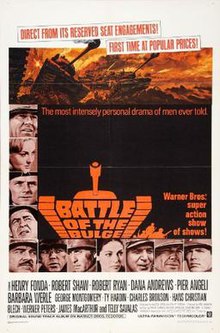| Battle of the Bulge | |
|---|---|
 Theatrical release poster | |
| Directed by | Ken Annakin |
| Written by | Philip Yordan Milton Sperling John Melson Bernard Gordon (uncredited)[citation needed] |
| Produced by | Milton Sperling Philip Yordan |
| Starring | Henry Fonda Robert Shaw Robert Ryan Dana Andrews Telly Savalas |
| Narrated by | William Conrad |
| Cinematography | Jack Hildyard |
| Edited by | Derek Parsons |
| Music by | Benjamin Frankel |
| Color process | Technicolor |
Production companies | |
| Distributed by | Warner Bros. Pictures |
Release date |
|
Running time | 170 minutes[1] |
| Country | United States |
| Language | English |
| Budget | $6.5 million[2] |
| Box office | $4.5 million (est. US/ Canada rentals)[3] |
Battle of the Bulge is a 1965 American widescreen epic war film produced in Spain, directed by Ken Annakin and starring Henry Fonda, Robert Shaw, Telly Savalas, Robert Ryan, Dana Andrews and Charles Bronson. The feature was filmed in Ultra Panavision 70 and exhibited in 70 mm Cinerama. Battle of the Bulge had its world premiere on December 16, 1965, the 21st anniversary of the titular battle, at the Pacific Cinerama Dome Theatre in Hollywood, California.
The film is a highly fictionalized account of the battle. The filmmakers attempted to condense the Battle of the Bulge, a World War II battle that stretched across parts of Germany, Belgium and Luxembourg and lasted nearly a month, into under three hours, and shot parts of the film on terrain, and in weather, that did not remotely resemble the actual battle conditions. That left them open to criticism for lack of historical accuracy, but they claimed in the end credits that they had "re-organized" the chronological order of events to maximize the dramatic story.
Unlike most other World War II epics, Battle of the Bulge contains virtually no portrayals of actual senior Allied leaders, civilian or military. That is presumably because of controversies surrounding the battle, both during the war and afterward. Allied forces ultimately won the battle, but the initial German counteroffensive caught them by surprise and caused many casualties.
- ^ BBFC. "Battle Of The Bulge". www.bbfc.co.uk. Retrieved 2021-11-17.
- ^ Bart, Peter (25 Oct 1964). "Hollywood: War Is Hell but Profitable". The New York Times. p. X7.
- ^ "Big Rental Pictures of 1966", Variety, January 4, 1967 p 8